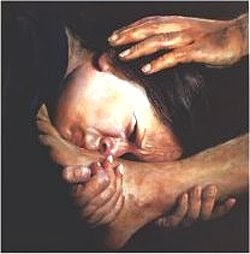 Jesus is eating dinner with a bunch of religious leaders at Simon’s house when a well-known prostitute walks in and begins showing Jesus a lot of attention (Luke 7:36-50). She causes quite a scene when she begins weeping and pouring perfume on Jesus and wiping his feet with her hair. Simon makes judgments against the woman and against the rabbi, Jesus, who doesn’t seem to know how awful she truly is. But Jesus looks this woman right in the eyes and says, “Your sins are forgiven.”
Jesus is eating dinner with a bunch of religious leaders at Simon’s house when a well-known prostitute walks in and begins showing Jesus a lot of attention (Luke 7:36-50). She causes quite a scene when she begins weeping and pouring perfume on Jesus and wiping his feet with her hair. Simon makes judgments against the woman and against the rabbi, Jesus, who doesn’t seem to know how awful she truly is. But Jesus looks this woman right in the eyes and says, “Your sins are forgiven.”
Now, I don’t know all this lady’s sins. I don’t know everything she’d ever done. I don’t know about all her poor decisions and terrible situations. I don’t know the details of all the hurt she had caused. But Jesus knew. He knew all of it. And he looked right at her and said, “Your sins are forgiven.”
Maybe the four most powerful words anybody can ever hear.
Maybe the four most difficult words anybody can ever say.
Forgiveness is hard. It’s not air freshener that we just spray from a can (psssht-phssht!) and “Ah, doesn’t that make everything better?” It’s not, “Oh, you really hurt me, you really sinned horribly against God and me, but (psssht-psssht!) I forgive you and now everything’s great!” No, it’s not like that at all. Forgiveness is hard. It’s achingly difficult. And, actually, fairly unnatural.
Elizabeth O’Connor wrote, “Despite a hundred sermons on forgiveness, we do not forgive easily nor find ourselves easily forgiven. Forgiveness, we discover, is always harder than the sermons make it out to be.” 
“Your sins are forgiven.” You need to hear that. You need to say it.
But, I know, it’s not easy. I struggle with some of this. We’ve all got questions, right? Even in this magnificent story of divine forgiveness in Luke, we’ve got questions: Did this woman even ask for forgiveness? Did Jesus tell her to “sin no more?” What about all the homes she had wrecked, what about those other wives and kids? Do they have any say? Where’s the truth in this story? Where’s the justice?
Real forgiveness is hard. But it imitates Jesus.
Notice that Simon, the religious expert, has one way of dealing with people who sin and Jesus, the Son of God, has another way. Simon wants to be right, he wants to be religiously and socially correct. So he separates himself from people who sin. He keeps this woman at a distance. He wants it very clear that he does not endorse this lady’s lifestyle. Jesus is, of course, anti-sin. He clearly teaches and preaches against every kind of sin. But he does not isolate himself from sinners. He understands that if the light is going to shine in the darkness, the light has to engage the darkness. Simon is distant and critical. Jesus is up close and personal.
Because Jesus sees the potential. There’s real possibility here. That’s why Jesus pursues and relates to sinners. Simon focuses on the woman’s past sins, Jesus is zeroed in on her future potential. That’s why he points out all the positive things she’s doing. Look, Simon, do you see this woman? Do you see her kindness and generosity, her goodness?
 What do we see? That’s one of the hard questions this story raises. Do we see sinners for who they are or for what God can do with them? If the Church really believes it has something eternal to offer in Christ Jesus, then we’ve got to relate to sinners the way Jesus did. God’s number one way of changing people is by offering them grace and forgiveness. Lots of people want to start all over again, they’re just not sure it’s possible. Jesus shows us here that no hole is too deep for the reach of God’s compassionate and delivering hand.
What do we see? That’s one of the hard questions this story raises. Do we see sinners for who they are or for what God can do with them? If the Church really believes it has something eternal to offer in Christ Jesus, then we’ve got to relate to sinners the way Jesus did. God’s number one way of changing people is by offering them grace and forgiveness. Lots of people want to start all over again, they’re just not sure it’s possible. Jesus shows us here that no hole is too deep for the reach of God’s compassionate and delivering hand.
So when we meet people whose lives are totally out of touch with God, we’ve got to be very patient and very kind. And we must forgive. Because nothing’s going to happen without God anyway. That sinner is not going to change without God. No chance.
See, that’s one of the places I struggle. Sometimes I want to put the cart before the horse. I want to see people clean up their act first, get everything in order, prove to me you’ve changed. Then I’ll forgive and have a relationship with you.
Jesus always makes the first move. Always. Jesus first extends his mercy and forgiveness. Jesus first establishes the relationship.
“Your sins are forgiven.” Have you said that to anybody lately? You need to. It’s a powerful way to imitate our Lord.
Peace,
Allan
Leave a Reply